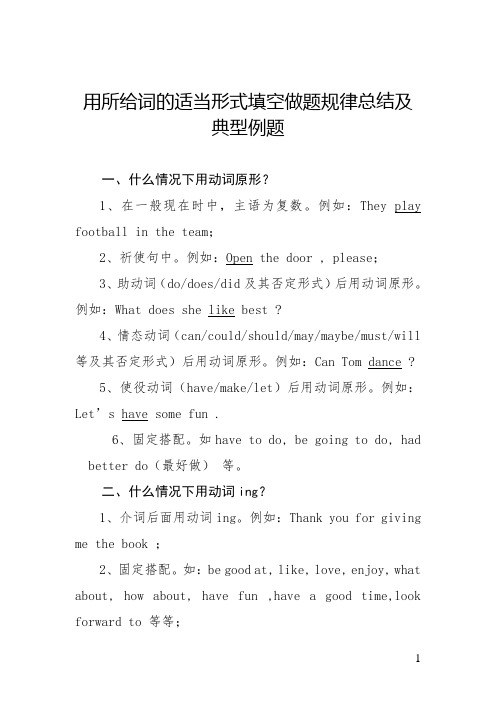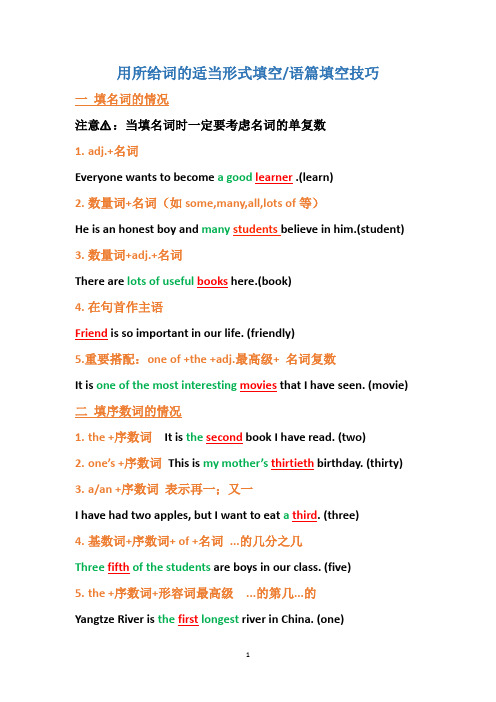如何做用所给词的适当形式填空:名词转成形容词实例
- 格式:doc
- 大小:20.00 KB
- 文档页数:1

英语用所给词的适当形式填空技巧英语学习中,掌握填空题的技巧对于提高语言能力和应试水平非常重要。
理解所给词的适当形式可以帮助我们准确填写答案。
以下是一些有效的技巧和方法,以便我们在填空题中取得更好的成绩。
1. 词性变化:在填空题中,我们需要根据句意和语法规则来确定所选词的正确形式。
因此,我们要注意单词的词性变化。
例如,名词变为形容词、动词的过去式和现在分词等。
2. 上下文语境:填空题通常会提供前后文的信息,我们应该仔细阅读上下文,理解句子的整体语境。
这样有助于我们选择适当的词性和词形来填写答案。
3. 语法规则:掌握一些常见的语法规则,如时态、语态、语法结构等,对于做填空题是非常有帮助的。
我们需要根据句子的结构和语法要求来选择正确的词形填空。
4. 前缀和后缀:英语中许多词具有相同的词根,通过增加前缀或后缀来改变词性或意义。
因此,我们在填空题中可以根据前缀和后缀的提示来确定正确的词形。
5. 上下文逻辑:有时,我们需要根据句子的逻辑关系来填写空白处的词。
根据句子之间的逻辑关系,我们可以推断出合适的词形填空。
6. 注意拼写和语法错误:填空题的正确性不仅取决于所选单词的词形是否正确,还取决于拼写和语法的准确性。
我们在填写答案时要仔细检查单词的拼写和语法使用是否正确。
在掌握了以上技巧之后,我们可以通过练习填空题来提高自己的技能。
经常阅读英语文章,做各种类型的填空题,加深对词性变化和语法规则的理解,提高填空技巧的灵活运用。
总之,英语填空题需要我们通过准确理解句子的语义和句法结构,选择适当的词形来填写空白处。
通过掌握词性变化、上下文语境、语法规则、前缀和后缀、上下文逻辑,以及注意拼写和语法错误等技巧,我们可以有效地提高填空题的答题能力,更好地应对英语考试。

名词变形容词的方法名词是我们日常生活中经常使用的词类,而在英语中,名词还可以通过一定的方法变成形容词,从而扩大了词汇的运用范围。
下面我们就来介绍一些名词变形容词的方法。
一、加“-al”或“-ial”。
很多名词在后面加上“-al”或“-ial”就可以变成形容词。
比如 nation(国家)→national(国家的),music(音乐)→musical(音乐的),history(历史)→historical(历史的)等等。
二、加“-y”。
有些名词在后面加上“-y”就可以变成形容词。
比如 beauty (美丽)→beautiful(美丽的),sun(太阳)→sunny(阳光明媚的),rain(雨)→rainy(多雨的)等等。
三、加“-ous”。
一些名词在后面加上“-ous”也可以变成形容词。
比如 danger (危险)→dangerous(危险的),fame(名声)→famous(著名的),poison(毒药)→poisonous(有毒的)等等。
四、加“-ful”。
还有一些名词在后面加上“-ful”也可以变成形容词。
比如help(帮助)→helpful(有帮助的),wonder(奇迹)→wonderful(美妙的),care(关心)→careful(小心的)等等。
五、不规则变形。
除了以上的规则变形外,还有一些名词的变形是不规则的,需要我们通过记忆来掌握。
比如 child(孩子)→childish(孩子气的),friend(朋友)→friendly(友好的),beauty(美丽)→beautiful(美丽的)等等。
总结,名词变形成形容词的方法有很多种,通过掌握这些方法,我们可以更加灵活地运用词汇,丰富我们的语言表达。
希望大家能够通过不断的练习和积累,掌握这些方法,提高自己的英语水平。

六年级英语名词变为形容词的方法在学习英语的过程中,我们经常会遇到需要将名词转化为形容词的情况。
这种转化有时可以帮助我们更准确地表达想要表达的意思。
在六年级阶段,学生们需要掌握一些基本的方法来将名词变为形容词。
本文将介绍一些常见的方法和例子,帮助六年级学生更好地理解和掌握名词变形形容词的技巧。
1. 在名词后面加-ing这是一种非常常见的转化方式,将名词转化为表示状态或性质的形容词。
例如:•名词: interest(兴趣)形容词: interesting(有趣的)•名词: amaze(惊讶)形容词: amazing(令人惊讶的)2. 在名词前面加形容词性后缀有些名词可以通过在名词前面添加特定的形容词性后缀来转化为形容词。
例如:•名词: beauty(美丽)形容词: beautiful(美丽的)•名词: danger(危险)形容词: dangerous(危险的)3. 在名词前面加不同的形容词性前缀在名词前添加不同的形容词性前缀,可以改变名词的意思,使其能够更准确地描述物体或事物的性质。
下面是一些常见的形容词性前缀和例子:•名词: happy(快乐)形容词: unhappy(不快乐的)•名词: possible(可能)形容词: impossible(不可能的)•名词: polite(礼貌)形容词: impolite(不礼貌的)4. 名词作形容词使用有时候,名词本身就可以作为形容词来使用,用来形容其他名词。
例如:•名词: lemon(柠檬)用法: lemon juice(柠檬汁)•名词: football(足球)用法: football game(足球比赛)在这些用法中,名词本身作为形容词来使用,起到了描述其他名词的作用。
5. 形容词短语修饰名词形容词短语是由形容词和副词组成的短语,可以用来修饰名词,表示名词的特征或性质。
例如:•名词: student(学生)形容词短语: hard-working student(努力学习的学生)•名词: book(书)形容词短语: interesting book(有趣的书)通过使用形容词短语,我们可以更加准确地描述名词所代表的对象。

名词与形容词的转换规则
名词和形容词之间的转换规则主要取决于词的含义和上下文。
一般来说,如果一个词在某种程度上描述了事物或状态,并且传达出一种性质或特征,那么它通常可以被视为一个形容词。
以下是一些基本的名词到形容词的转换规则:
1. 描述性名词转为形容词:一些名词因其用途、材料或来源等而被用作形容词。
例如:“一把椅子”中的“椅子”就是名词,但在表达感觉或情感的语境中,“舒适的椅子”就变成了形容词。
2. 抽象名词具体化:某些抽象名词可以转化为具体的形容词。
比如,“好的主意”是一个抽象概念,但如果你想表达“非常好的主意”,那么你就把它转化为了具体的形容词。
3. 程度修饰:我们可以通过添加程度副词(如"非常","相当","极其")来将名词转变为形容词。
例如,"良好的教育环境"可以直接通过增加程度副词变为"非常良好的教育环境"。
4. 结合上下文:有时候,特定的名词可能需要根据其上下文来确定是否转换为形容词。
如在一些情境下,“经济”通常被用作名词,而在其他情况下,“经济的”一词则可以作为形容词使用。
请注意,这只是一般情况下的转换规则,并非所有情况都适用。
在实际应用中,理解和确定特定词汇的使用方式需要考虑到语境和其他因素。

用所给词的适当形式填空做题规律总结及典型例题一、什么情况下用动词原形?1、在一般现在时中,主语为复数。
例如:They play football in the team;2、祈使句中。
例如:Open the door , please;3、助动词(do/does/did及其否定形式)后用动词原形。
例如:What does she like best ?4、情态动词(can/could/should/may/maybe/must/will 等及其否定形式)后用动词原形。
例如:Can Tom dance ?5、使役动词(have/make/let)后用动词原形。
例如:Let’s have some fun .6、固定搭配。
如have to do, be going to do, had better do(最好做)等。
二、什么情况下用动词ing?1、介词后面用动词ing。
例如:Thank you for giving me the book ;2、固定搭配。
如:be good at, like, love, enjoy, what about, how about, have fun ,have a good time,look forward to 等等;3、go+动词ing。
例如:go swimming, go shopping, go fishing, go skating等等;4、课程。
Reading lesson, Dancing lesson, Drawing lesson等等5、标识。
No Smoking, No Parking等等;6、动词ing开头做主语。
例如:Smoking is bad for your health.7、进行时态。
Be动词+动词ing。
例如:I am doing my homework now .动词ing变形规则:一般加ing,以e结尾的去e加ing (make、take等,但see除外);以“辅音+元音+辅音”结尾的双写最后一个字母加ing(swim/run)。

用所给词的适当形式填空/语篇填空技巧一填名词的情况注意⚠:当填名词时一定要考虑名词的单复数1.adj.+名词Everyone wants to become a good learner .(learn)2.数量词+名词(如some,many,all,lots of等)He is an honest boy and many students believe in him.(student) 3.数量词+adj.+名词There are lots of useful books here.(book)4.在句首作主语Friend is so important in our life. (friendly)5.重要搭配:one of +the +adj.最高级+ 名词复数It is one of the most interesting movies that I have seen. (movie)二填序数词的情况1.the +序数词It is the second book I have read. (two)2.one’s +序数词This is my mother’s thirtieth birthday. (thirty)3.a/an +序数词表示再一;又一I have had two apples, but I want to eat a third. (three)4.基数词+序数词+ of +名词...的几分之几Three fifth of the students are boys in our class. (five)5.the +序数词+形容词最高级...的第几...的Yangtze River is the first longest river in China. (one)6.次数+a week/month 每周/月多少次注意⚠once 一次twice 两次>=3次基数词+ timesI often play basketball twice a week. (two)7.基数词+ 名词复数My brother is two years old. (second)三人称代词的情况1.形物代+ 名词(形容词性物主代词相当于形容词的用法)I think students should be allowed to choose the style of their school uniforms. (they)2.动词/介词+宾格He often teaches me math. (I)不是同一个人I think he should worry about her. (she)动词/介词+反身代词He often teaches himself math. (he)同一个人,自学His brother always thinks about himself. (he)3.常见搭配①by +反身代词靠某人自己My sister often does her homework by herself. (she)②enjoy +反身代词玩得开心=have fun=have a good timeWe all enjoyed ourselves last week. (us)③help+反身代词请随意/帮助某人自己We help others is to help ourselves. (us)③dress +反身代词给某人自己穿衣服My brother is old enough to dress himself now. (he)四形容词adj.的情况1.adj. +名词There are many cultural differences between the East and West. (culture)He gave me some useful suggestions. (use)2.be动词+adj.That British teacher is very humorous. (humor)3.感官动词+adj. (look, feel,sound,smell,taste)Our teacher felt satisfied with our progress after the exam result came out. (satisfy)4.常见系动词(get/become/keep/remain)+adj.If you want to keep healthy, you need to do exercise. (health)5.比较级和最高级的应用句中有than, 用adj.比较级This book is more interesting than that one. (interest)as +adj.原级+as...和...一样My clothes is as beautiful as yours. (beauty)the+ adj.比较级,the +adj.比较级越...就越...The harder (hard) you study,the better (good) your grade gets.one of +the +adj.最高级+名词复数...中最...的一个This book is one of the most valuable books that I have read. (value)五副词的情况注意⚠副词在句中不充当任何成分,在句中只起修饰作用,如修饰形容词/动词句子不缺主语谓语宾语表语就填副词I am taking notes carefully. (careful)主谓宾Those flowers are extramely beautiful. (extrame)主语系动词表语六动词的情况1.谓语动词(填谓语动词,先考虑时态和语态,再看三单)形式:主语+谓语动词My father likes playing basketball every day. (like)2.非谓语动词1.V+ doing sth 如enjoy doing sth 喜欢做某事My sister enjoys playing ping-pong after school. (play)2.V+ sb +to do sth 如need sb to do sth 需要某人做某事I need you to help me carry the box. (help)3.V+ sb do sth 如hear sb do sth 听见某人做某事I heard someone shout loudly just now. (shout)4.介词+ V ingI’m look forward to seeing a movie with you. (see)5.放在句首作主语,用V ing 形式Eating too much is bad for your health. (eat)附经典题训练;(用所给单词的适当形式完成句子):1. Would you mind making a little less _____? They are having a meeting at the moment. (noisy)2. The Smiths live on the __________ floor of the highrise. (nine)3. All the great __________ are respected(尊敬)by the world. (invent)4. My pet is a ______ cat. She is very lovely. (male)5. I’ll do my homework more __________ next time. (care)6. When you study a foreign language, it’s important to make a good _________. (begin)7. Everyone knows such kind of books is___________ to children. They shouldn’t be sold at any bookstore. (harm)8. In the past punishment(惩罚)was decided by the university. The student had no ___________ but to accept it. (choose)9. Our teacher told us the ___________ story I had ever heard at yesterday’s class meeting. (sad)10. The __________ Lesson is very difficult but very important. You must learn it by heart.(twelve)11. They looked very _____ in the idea. (interest)12. After they got on the bus, they found two_______. (sit)13. Help __________ to the fish, everyone. (you)14. What we have had is just part of the truth. We should try to get __________ information about it. (far)15. A ___________ sight stopped them from going forward. (frighten)16. He seemed very _________. He got a D in the English test. (happy)17. Before you start this work, you should try to realize its _________. (important)18. March 8 is _________ Day. (woman)19. This book belongs to you. Where is _____? (me)20. The visitors are ________ students. (main)21. Do you know about the ___ of the book? (write)22. Can you show me your ___ of coins? (collect)23. To my ________, I got full marks for maths last week. (surprised)24. In this new housing estate there stand a lot of high and magnificent _________. (build)25. In winter, most of the rivers and lakes are_________. It becomes a world of ice. (freeze)26. Then he slowly walked _____ the house. (pass)27. Do you know who is the __________ of the English contest? (win)28. Peter is very ______. I’m sure he will come to take care of your baby when he’s asked to. (help)29. The Yangtze River is the _________ longest river in the world. (three)30. __________ to meet all of you here. (please)31. Now more and more gardens are being built in our __________. (neighbour)32. It’s very important for us to learn English __________. (good)33. Both our teacher and my mother are satisfied with my ___________. (honest)34. Oliver Twist ate the cake ___________. (hungry)35. Of all the boys, Li Ming studies ______. (hard)36. We are all pleased to hear that the _________ went on very well. ( operate)37. The children in this kindergarten have been trained to take care of ___________ though they are only six years old. (they)38. Could you tell me who will give us a___________ on children’s education? (speak)39. These modern machines work . (automatic)40. This cartoon film is _________ than the one I saw last Saturday. (fun)41. Will you please tell me how much the___________ is? (post)42. The twin sisters used to be __________ in Hollywood. (act)43. Actions speak more _____ than words. (loud)44. I am _______ about my schoolwork because I haven't worked hard this term. (worry)45. Your pet dog is so __________ that all of us like to play with it. (love)46. It has been snowing ___ for a whole day. (heavy)47. We have been told the ______ of the case. (true)48. Have you made your ________ yet? (decide)49. People from Italy are called ___________. (Italy)50. I _________ where he comes from. (wonderful)51. The weather in April is _________, so you’d better take more clothes with you. (change)52. Ferries come and go on the river as___________ as boats. (quick)53. Listen, everybody, we will meet at the________ of the cinema at 4 pm. (enter)54. You cannot eat so much fast food, because it is ___________. (health)55. It is reported that three __________ have been put into prison. (Canada)56. Time flies _________ and never returns. (swift)57. We saw her running _________ the street just now. (cross)58. Do English people shake hands as often as _______? (Germany)59. We all know that there’s no _________ thing on the moon. (live)60. In order to make the trip ____________ for his children, Mr. Green kept the name of the destination (目的地) a secret. (excite)61. A _________ team from China will arrive in America next week. (medicine)62. This morning I lost my handbag and this afternoon I fell off my bike and broke my leg. I think it is an __________ day. (luck)63. Many students are not able to pay their college ________. (expensive)64. British people eat a large number of . (potato)65. She seems an __________ girl. (honesty)66. We tried all sorts of __________, but they were all useless. (medical)67. The digital (数码) camera is one of the __________ of the modern science. (wonderfully)68. I wouldn’t do business with such a __________ man. (fool)69. Carl looks much ________ than before. (health)70. I was _________ to meet Jane in a foreign country. (surprise)71. The mother was _________ to the brave man who had saved her son. (thank)72. I happened to meet a group of __________ on my way home yesterday. (France)73. The little boy can run a marathon in__________ than three hours. (little)74. I was told that my class teacher’s daughter would leave __________ school this July. (second)75. It’s a _________ to have a picnic with all the family members. (please)76. The lost calculator has been returned to its __________. (own)77. Be sure to let me know whenever you are in __________. ( dangerous)78. The completion (完成) of the big bridge made every one of us _________ and happy. (exciting)79. The __ is not so good as we expected. (perform)80. What a __________ day it is today! Shall we go to have a picnic in the countryside? (sun)。
名词变形容词的变化规则口诀名词变形容词的变化规则口诀一、概念概括要深入了解名词变形容词的变化规则,首先需要了解名词和形容词的基本概念。
名词是指人、事物、地点或概念的名称,而形容词则用来描述名词的特征、性质或状态。
二、形容词派生规则1. 一般情况下,名词+的=形容词例如:美丽的花,高大的建筑2. 以“-性”、“-的”结尾的名词,直接加上“的”变成形容词例如:善良的人,灵巧的动作3. 以双音节名词结尾的,直接加上“的”变成形容词例如:健康的身体,安静的环境4. 以“-人”、“-物”等结尾的名词,直接加上“的”变成形容词例如:聪明的人,可爱的动物5. 以“-子”、“-种”、“-度”等结尾的名词,直接加上“的”变成形容词例如:幼稚的孩子,多样的种类,宽广的度量6. 以两个相同的字组成的名词,直接加上“的”变成形容词例如:简单的问题,明亮的灯光7. 特殊情况下,名词前加“有”或“无”构成形容词例如:有害的物质,无私的奉献三、实际应用与总结通过以上规则的总结,我们可以得出名词变形容词的变化规则口诀:双音节结尾加“的”,有“-性”、“-的”直接用,“-人”、“-物”不重复的。
四、个人观点和理解名词变形容词的变化规则既有一般的变化规律,又有一些特殊的情况需要注意。
在实际运用中,需要多加练习和总结,才能更熟练地掌握。
要根据具体的语境和句子结构来灵活运用这些规则,才能表达准确而流畅的语言。
在撰写本次文章时,我们以从简到繁、由浅入深的方式探讨了名词变形容词的变化规则,希望能为您带来深入理解和灵活运用的帮助。
总结回顾以上内容,通过学习和积累,相信您可以轻松掌握名词变形容词的变化规则,并在写作和交流中更加得心应手。
至此,我们对名词变形容词的变化规则进行了全面的了解和探讨,希望本文能为您带来帮助,期待您对这个主题的更深入的理解和灵活应用。
名词变形容词的变化规则为我们提供了一种在表达语言时更加准确和生动的方式。
通过将名词转化为形容词,我们可以更好地描述事物的特征、性质和状态,使得表达更加丰富和生动。
名词变形容词的方法
一种将名词转变为形容词的常见方法是使用后缀。
以下是几种常见的后缀和其对应的名词形容词转换方法:
1. -al:将名词的末尾的e去掉,再加上-al。
例如:music(音乐)→musical (音乐的)
2. -ful:在名词的末尾加上-ful。
例如:beauty(美丽)→beautiful(美丽的)
3. -ive:将名词的末尾的e去掉,再加上-ive。
例如:active(活跃)→active (积极的)
4. -ic:在名词的末尾加上-ic。
例如:history(历史)→historic(历史性的)
5. -ary:在名词的末尾加上-ary。
例如:library(图书馆)→library(图书的)
6. -ous:在名词的末尾加上-ous。
例如:danger(危险)→dangerous(危险的)
7. -ish:在名词的末尾加上-ish。
例如:child(孩子)→childish(孩子气的)值得注意的是,并非所有名词都可以通过添加后缀来变成形容词。
有时需要使用
其他方法,例如改变词根或使用不规则形式。
用所给词的适当形式填空的做题方法【知识点讲解】一、用所给词的适当形式填空是中考常见的试题类型之一,旨在考查学生的英语基础知识和综合运用英语的能力。
解此类型的试题可遵循以下步骤:1.明确所给词的词性2.弄清所给句子的意思3.确定空白处所需的词性4正确写出所填的词二、用所给词的适当形式填空主要考查以下词类:对名词的考查1.考查可数名词的单数形式转换成复数形式注意:常见的不可数名词:(1).即使其前面有形容词修饰,也不可以用不定冠词a/an。
beauty(作"美丽的人或物"讲,可数) age(年龄) anger bravery(勇敢) change(零钱) courage(勇气) culture evidence energyhair("几根头发",可数) food fun furniture happiness(幸福)experience(经验)(作"经历"讲,可数) harm health(健康) homework honour(荣誉) ice im p o r t a nc e(重要性)industry informationpaper(纸)(作"试卷"或"报纸"讲,可数) kindness labour literature luck luggage marriage money musicsnow(作" 积雪"讲,用复数) nature news peace permission power produce progress researchsucc ess(成功)(作"成功的事或人"讲,可数) rubbish safety salt sand silence strength stationery traffict im e(时间)(作"次数"讲,可数) transport travel truth value waste water weather wisdomwork (工作)(作"著作"讲,可数)wind advice(建议)(2). (其前有形容词修饰),可以用不定冠词a/an:breakfast comfort a good education danger death dinner help honor horror joy knowledge lunch rain sleep pleasure pride pity shame supper support surprise shock wonder(作"令人惊讶之物"或"奇迹"讲,可数)(3).只有复数形式的名词:clothes glasses(眼镜) people trousers goods(商品) wishes(祝愿) congratulations(祝贺) thanks(感谢)等。
名词变为形容词的方法 IMB standardization office【IMB 5AB- IMBK 08- IMB 2C】一、名词变为形容词的方法1. 在名词后面加-y可以变成形容词(尤其是一些与天气有关的名词)。
例如:rain—rainy, cloud—cloudy, wind—windy, snow—snowy, health—healthy, luck—lucky等。
注意:1)如果名词以重读闭音节结尾,且词尾只有一个辅音字母,这时应双写词尾的辅音字母再加-y。
如:sun—sunny, fun—funny等。
2)少数以不发音的e结尾的名词变为形容词时,应去掉e再加-y。
例如:noise—noisy, ice—icy 等。
2. 一些抽象名词在词尾加-ful可以变为形容词。
例如:care—careful, thank—thankful, help—helpful, use—useful, beauty—beautiful等。
3. 一些表示国家的名词可以在词尾加-ese, -ish或-n构成表示国籍、语言的形容词。
例如:China—Chinese, Japan—Japanese, England—English, America—American, India—Indian, Australia —Australian(注意Canada—Canadian)。
4.在名词后加-ous变为形容词。
例如:danger—dangerous等。
5. 在名词后加-ly变为形容词。
例如:friend—friendly, love—lovely等。
6.在名词后加-less构成含有否定意义的形容词。
例如:care—careless(粗心的),use—useless(无用的),hope—hopeless(没希望的),home—homeless(无家可归的)等。
7. 一些以-ence结尾的名词,把ence改为ent变成形容词。